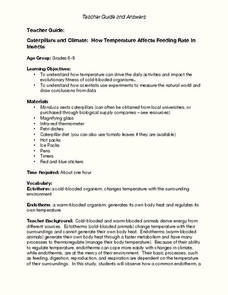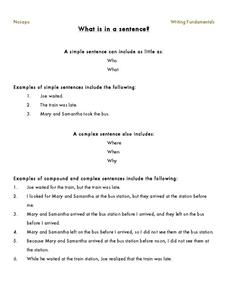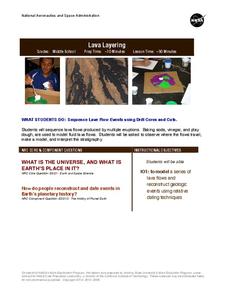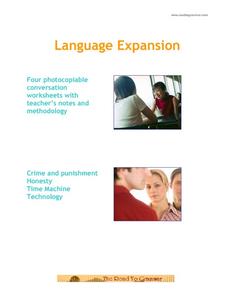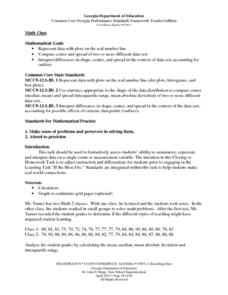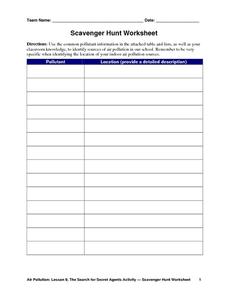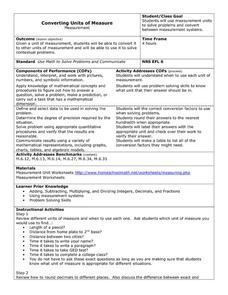Curated OER
The Day Eddie Met the Author: vocabulary
In this vocabulary activity, 3rd graders match the vocabulary word with its definition from the story The Day Eddie Met the Author. Students complete 10 matches.
Curated OER
Units Multiplication Closure Activity
In this multiplication worksheet, students complete multiplication word problems dealing with numbers 1 through 9. Students complete 8 problems.
Saint Louis Zoo
Introduction to Natural Selection: Darwin & Lamarck
Charles Darwin and Jean Baptiste Lamarck are credited for developing the theory of natural selection. After teaching your beginning biologists about acquired characteristics, they read the included selection and answer questions that...
abcteach
Dragon Alliterations
You don't have to slay the dragon in this activity. Young writers review poetic devices with a set of worksheets about alliteration and similes. Once they finish waxing poetic about their dragon friends, they craft a final acrostic poem.
Smithsonian Institution
Solomon G. Brown: Letter Writing
Personal correspondence in the form of letters is not as common as it once was. This resource presents an opportunity for you to introduce your class to letter writing and cover topics in social studies. Learners read a letter written in...
Statistics Education Web
First Day Statistics Activity—Grouping Qualitative Data
Making groups of groups can help to organize data. Classes use statistics to group themselves using descriptive adjectives. The objective is for learners to understand that grouping qualitative data is useful when the original groups are...
Nosapo
Telling Time
It's grammar time! Class members practice telling time in English with a series of clock illustrations. They then use the prompts to discuss the time of day, including English colloquialisms, with partners or group members.
Curated OER
Caterpillars and Climate: How Temperature Affects Feeding Rate In Insects
Do you eat more when you are hot or when you are cold? Young scientists observe the eating pace of two caterpillars at different temperatures. The differences in endotherm and ecotherm animals' ability to adjust to temperature change...
Nosapo
What Is in a Sentence, Paragraph, and Story?
Language arts is made up of many parts. Learners review the parts of a sentence, as well as how to make a simple sentence into a complex sentence, before examining full paragraphs and identifying the topic, body, and concluding sentence...
Career Solutions Publishing
It’s For Real Workplace Ethics
Discuss the ethical and practical consequences of dishonesty at work by analyzing a hypothetical situation in which a young employee at a pizza shop is being asked by her friends for free meals.
Charleston School District
Negative Exponents Operations
Are exponent rules different if the exponents are negative? Using the definition of negative exponents and the rules of exponents, the resource shows that the rules of exponents hold independent of the sign of the exponent. Practice...
NASA
Lava Layering
Take the old baking soda and vinegar volcano to the next level by using it to study repeated lava flows over time, examine geologic features on Earth and Mars, and speculate about some of the formations on Mars.
Road to Grammar
Language Expansion
Improve your pupils' language skills with these discussions and activities. There are four topics included here, and each is paired with discussion prompts (small group and whole class), student handouts, and teacher notes. After...
Georgia Department of Education
Math Class
Young analysts use real (provided) data from a class's test scores to practice using statistical tools. Not only do learners calculate measures of center and spread (including mean, median, deviation, and IQ range), but also use this...
Bethel School District
Observations and Inference
What's the difference between qualitative and quantitative observations? Learners make observations, inferences, and predictions about their environment with a set of questions and activities that are applicable to either language arts...
Charleston School District
Parallel Lines Cut by a Transversal
Pupils study angle measurements between different types of angles associated with parallel lines and transversals. The independent practice asks pupils to identify the types of angles in a diagram and to determine the measure of angles.
Statistics Education Web
Did I Trap the Median?
One of the key questions in statistics is whether the results are good enough. Use an activity to help pupils understand the importance of sample size and the effect it has on variability. Groups collect their own sample data and compare...
TryEngineering
Program Your Own Game
Young computer scientists get to see what it's like to be a software engineer as they use free online software to design a computer game. They play and evaluate games groups created to round out the activity.
NASA
The Discovery of Jupiter Radio Waves
Lead your class on a journey to the planet Jupiter and provide them with fun facts in the process. Learners explore radio waves emitted by Jupiter to further understand how this data helps our daily lives. They conclude by discussing...
Curated OER
Scavenger Hunt Worksheet
Exactly how environmentally friendly is your school? From the air fresheners in the bathrooms to the cleaning solvents used in the classrooms, young conservationists search the school grounds for sources of air pollution in...
Texas Education Agency (TEA)
Principles of First Aid and Medical Emergencies
Here is a great resource to guide your instruction on identifying medical emergencies and administering first aid when necessary. Topics covered include assessing the scene of an emergency, calling EMS, and addressing a range of medical...
Ohio Literacy Resource Center
Converting Units of Measure
Follow six steps to implement this series of metric worksheets. Here, mathematicians exhibit their knowledge of problem solving, while converting units of measurement and label their answers with the applicable unit name.
Statistics Education Web
Double Stuffed?
True or false — Double Stuf Oreos always contain twice as much cream as regular Oreos. Scholars first measure the masses of the filling in regular Oreos and Double Stuf Oreos to generate a class set of data. They use hypothesis testing...
Chymist
Determination of the Volume of CO2 in Pop Rocks
Where does the pop in pop rocks come from? An engaging activity asks scholars to measure the amount of carbon dioxide in a package of Pop Rocks candy. Learners dissolve the candy in water and use the solubility of CO2 to determine its mass.









